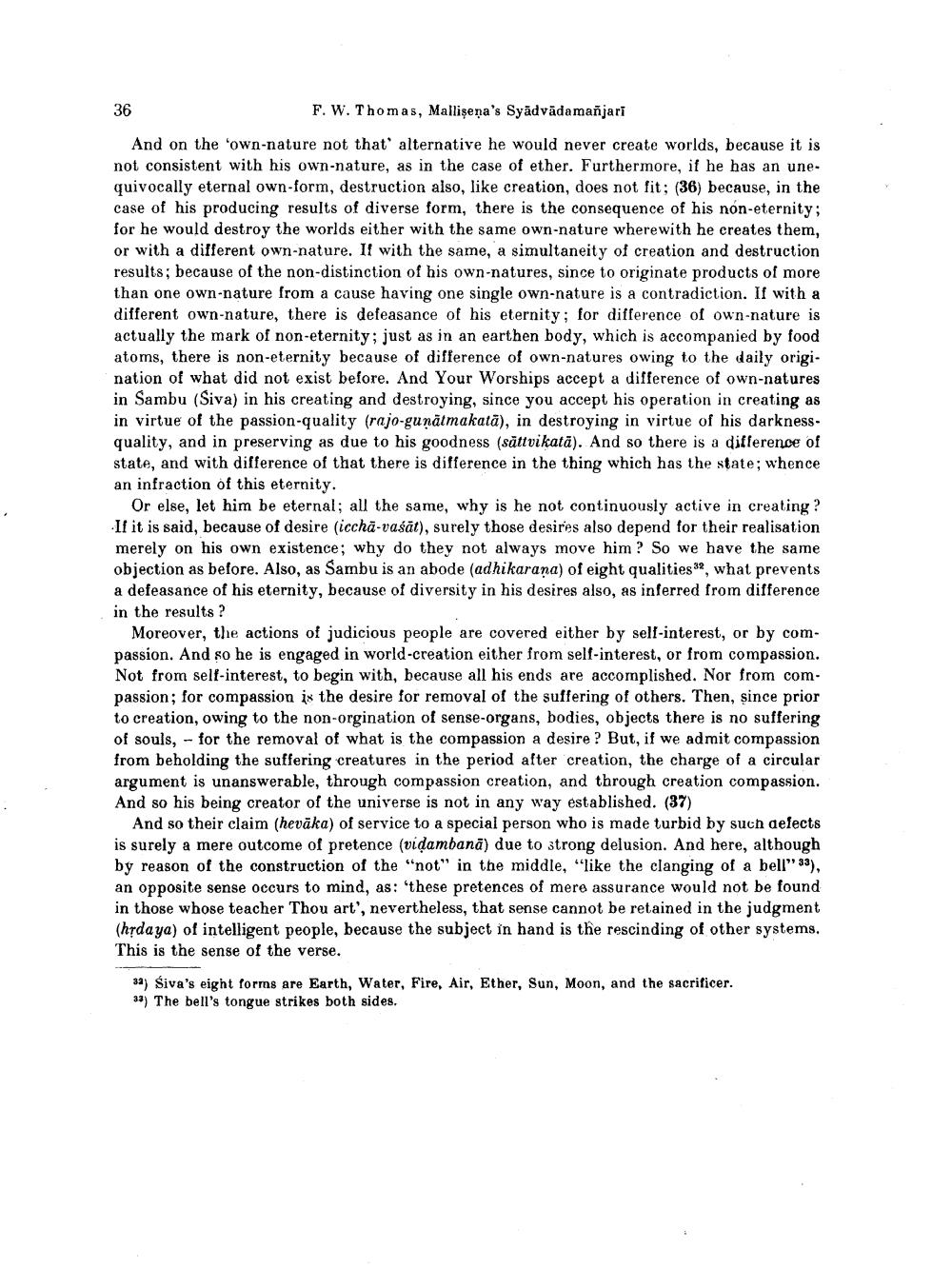________________
36
F. W. Thomas, Mallisena's Syädvädamañjari
And on the 'own-nature not that alternative he would never create worlds, because it is not consistent with his own-nature, as in the case of ether. Furthermore, if he has an une. quivocally eternal own-form, destruction also, like creation, does not fit; (36) because, in the case of his producing results of diverse form, there is the consequence of his non-eternity; for he would destroy the worlds either with the same own-nature wherewith he creates them, or with a different own-nature. Il with the same, a simultaneity of creation and destruction results; because of the non-distinction of his own-natures, since to originate products of more than one own-nature from a cause having one single own-nature is a contradiction. If with a different own-nature, there is defeasance of his eternity; for difference of own-nature is actually the mark of non-eternity; just as in an earthen body, which is accompanied by food atoms, there is non-eternity because of difference of own-natures owing to the daily origination of what did not exist before. And Your Worships accept a difference of own-natures in Sambu (Siva) in his creating and destroying, since you accept his operation in creating as in virtue of the passion-quality (rajo-gunātmakatā), in destroying in virtue of his darknessquality, and in preserving as due to his goodness (sättvikatā). And so there is a difference of state, and with difference of that there is difference in the thing which has the state; whence an infraction of this eternity.
Or else, let him be eternal; all the same, why is he not continuously active in creating? If it is said, because of desire (icchā-vaśāt), surely those desires also depend for their realisation merely on his own existence; why do they not always move him ? So we have the same objection as before. Also, as Sambu is an abode (adhikarana) of eight qualities, what prevents a defeasance of his eternity, because of diversity in his desires also, as inferred from difference in the results ?
Moreover, the actions of judicious people are covered either by self-interest, or by compassion. And so he is engaged in world-creation either from self-interest, or from compassion. Not from self-interest, to begin with, because all his ends are accomplished. Nor from compassion; for compassion is the desire for removal of the suffering of others. Then, since prior to creation, owing to the non-orgination of sense-organs, bodies, objects there is no suffering of souls, - for the removal of what is the compassion a desire ? But, if we admit compassion from beholding the suffering creatures in the period after creation, the charge of a circular argument is unanswerable, through compassion creation, and through creation compassion. And so his being creator of the universe is not in any way established. (37)
And so their claim (heväka) of service to a special person who is made turbid by such defects is surely a mere outcome of pretence (vidambanā) due to strong delusion. And here, although by reason of the construction of the "not" in the middle, "like the clanging of a bello 33), an opposite sense occurs to mind, as: 'these pretences of mere assurance would not be found in those whose teacher Thou art', nevertheless, that sense cannot be retained in the judgment (hrdaya) of intelligent people, because the subject in hand is the rescinding of other systems, This is the sense of the verse.
32) Siva's eight forms are Earth, Water, Fire, Air, Ether, Sun, Moon, and the sacrificer. **) The bell's tongue strikes both sides.




